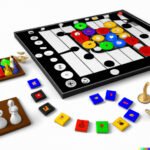Are you looking for engaging and educational activities for your kids? Look no further than classic board or card games for 2 player kids. These timeless games offer a wealth of benefits for children, from enhancing cognitive skills to promoting social interaction. In this article, we’ll delve into the world of classic board and card games, exploring their advantages and providing recommendations for family-favorite titles.
Playing board and card games isn’t just about having fun – these activities also support children’s cognitive, social, and emotional development. From strategic thinking in chess to turn-taking in Go Fish, each game offers unique opportunities for learning and growth. By engaging in these traditional pastimes, kids can sharpen their problem-solving abilities, practice good sportsmanship, and build important social skills.
In the following sections, we’ll showcase the top 5 classic board games and top 5 classic card games ideal for 2 player kids. From beloved favorites like checkers and Crazy Eights to lesser-known gems like Connect Four and Old Maid, there’s something here to captivate every young player.
Whether you’re a seasoned game enthusiast or new to the world of classic board and card games, we have plenty of tips to help you introduce your little ones to these entertaining pastimes.
Benefits of Playing Board and Card Games
Board and card games have been a staple in children’s playtime for generations, and with good reason. These classic games offer numerous benefits that support children’s cognitive, social, and emotional development. By engaging in these activities, kids can hone critical thinking skills, improve their social interactions, and develop emotional resilience.
Some of the key benefits of playing board and card games for 2 player kids include:
- Enhanced cognitive skills: Traditional games like chess and checkers require strategic thinking, problem-solving, and planning ahead. These activities can help children develop their decision-making abilities and critical thinking skills.
- Improved social interactions: Playing these games with a friend or family member can help children learn important social skills such as turn-taking, good sportsmanship, and effective communication.
- Emotional development: Board and card games provide opportunities for children to experience winning and losing in a controlled environment. This can help them build resilience, cope with disappointment, and understand the concept of fairness.
In addition to these benefits, board and card games also offer a break from screen time and encourage meaningful face-to-face interaction between kids. As parents and caregivers, introducing these classic games to children can provide them with valuable learning experiences while also creating lasting memories of fun times spent with loved ones.
Top 5 Classic Board Games for 2 Player Kids
Chess, checkers, and Connect Four are among the most beloved and classic board games for 2 player kids. Not only do these games provide hours of entertainment, but they also offer numerous cognitive and social benefits for children. Chess, for example, has been shown to improve a child’s memory, concentration, and problem-solving skills.
Similarly, checkers can help kids develop their strategy and critical thinking abilities. Connect Four also offers opportunities for children to think strategically while also promoting spatial awareness.
One of the best things about these classic board games is that they are timeless – generations of kids have enjoyed playing them, proving that they stand the test of time. These games are not only incredibly fun, but they also bring families together in friendly competition. Additionally, chess, checkers and Connect Four are easy to learn yet challenging to master, making them suitable for children of all ages.
| Classic Board Game | Description |
|---|---|
| Chess | An ancient game of strategy that helps develop memory, concentration and problem-solving skills in children. |
| Checkers | A classic game that promotes strategic thinking and critical reasoning in a simple yet engaging format. |
| Connect Four | An exciting game that encourages spatial awareness and strategic thinking as players aim to connect four discs in a row. |
From family game nights to leisurely afternoons with friends, these board games never go out of style. Their enduring popularity makes them an excellent choice for parents who want to introduce their children to traditional forms of entertainment that offer both fun and enriching experiences at the same time.
So the next time you’re looking for a fun activity that allows your young ones to have a break from screens while promoting learning and valuable social skills, consider one of these timeless classic board games for kids.
Top 5 Classic Card Games for 2 Player Kids
Playing card games with kids can be a fun and educational way to spend quality time together. Classic card games for 2 players are not only entertaining but also help children develop important skills such as critical thinking, strategy, and social interaction. Here are some popular choices that have been enjoyed by generations of kids:
Go Fish
Go Fish is a simple yet engaging game that helps children practice their memory and matching skills. Players try to collect sets of four matching cards by asking their opponent if they have a specific rank of card. The game encourages communication and turn-taking, making it an ideal choice for young children.
Old Maid
Old Maid is a timeless favorite that involves players forming pairs and trying to get rid of all their cards. One card is designated as the “Old Maid,” and the player left holding this card at the end of the game loses. Old Maid teaches children about recognizing patterns and taking calculated risks.
Crazy Eights
Crazy Eights is a fast-paced game that challenges players to match cards by either suit or rank. The game also introduces the concept of special action cards, such as skipping other players or changing the suit in play. Crazy Eights helps children learn about strategy and adaptability while keeping them entertained.
These classic card games are not only enjoyable for kids but also provide valuable learning opportunities. Whether it’s improving memory, strategic thinking, or social skills, playing these games can contribute to a child’s overall development in a positive way. So next time you’re looking for an activity to enjoy with your child, consider bringing out a deck of cards and introducing them to these timeless favorites.
Tips for Teaching Children How to Play These Games
When teaching children how to play classic board or card games, it’s important to be patient and clear in your instructions. Here are some strategies for introducing kids to the rules and strategies of each game:
1. Start with the basics: Begin by explaining the objective of the game and the basic rules. For example, in chess, explain that the goal is to checkmate your opponent’s king, and show them how each piece moves.
2. Use visual aids: Visual aids such as diagrams or illustrations can help children understand the rules better. For card games, you can create a cheat sheet with the ranks of each card so they can refer to it during play.
3. Practice makes perfect: Encourage children to practice playing the game with you before involving other players. This will give them a chance to learn at their own pace and ask questions as they go along.
By using these strategies, you can help children learn how to play classic board and card games while also fostering their problem-solving and critical thinking skills. Remember to be encouraging and supportive throughout the learning process, and most importantly, have fun.
How to Create a Positive Gaming Environment
Creating a positive gaming environment for children is essential to their enjoyment and learning during game play. It helps them develop important social skills such as sportsmanship, fairness, and respect for others. Here are some strategies to foster a positive gaming environment for 2 player kids:
Set Clear Expectations
When playing classic board or card games with kids, it’s important to set clear expectations for behavior during game play. Let them know that good sportsmanship and fairness are valued qualities in the game, and that winning or losing gracefully is part of the fun.
Lead by Example
As a parent or caregiver, it’s important to model good sportsmanship and fairness when playing games with children. Show them how to handle winning and losing with grace, and emphasize the importance of respecting the other player, regardless of the outcome.
Encourage Positive Communication
Encouraging open and positive communication between players can help create a supportive gaming environment. Remind kids about the importance of using kind words, taking turns, and being respectful towards each other during game play.
By implementing these strategies, parents and caregivers can ensure that children have a positive and enjoyable experience when playing classic board or card games with 2 players. This in turn can help kids develop crucial social skills that will benefit them both on and off the game board.
Fun Variations and Twists on Classic Games
Classic board and card games are timeless activities that can provide endless entertainment for kids. However, after playing the same game multiple times, children may start to lose interest. To keep the fun fresh and exciting, there are a variety of creative ways to add variations and twists to classic games that kids will love.
One fun way to mix things up is by introducing themed versions of classic games. For example, instead of regular checkers pieces, use character-themed pieces from a popular movie or television show that your child loves. This simple change can make the game feel new and exciting while adding an element of novelty that keeps kids engaged.
Another way to add a twist to classic games is by incorporating challenges or obstacles into the gameplay. For chess, you could introduce a time limit for each player’s turn or play on a non-traditional board with added obstacles or barriers. These changes can elevate the level of difficulty and strategic thinking required, making the game more challenging and engaging for kids.
Additionally, consider combining elements from different games to create a unique hybrid game. Mix rules and components from two different card games or combine aspects of chess with checkers to create a whole new gaming experience. This can add an element of surprise and creativity, sparking kids’ imagination while providing an entirely new set of rules and strategies to master.
These creative variations and twists help maintain children’s interest in classic board and card games while nurturing their cognitive skills through new challenges and unexpected gameplay experiences.
| Variation Idea | Description |
|---|---|
| Themed Versions | Use character-themed pieces from a popular movie or television show |
| Challenges/Obstacles | Add time limits for each player’s turn or play on non-traditional boards |
| Hybrid Game Creation | Combine elements from different games to create a unique gaming experience |
Resources for Finding Classic Board and Card Games for 2 Player Kids
In conclusion, classic board and card games for 2 player kids offer a multitude of benefits for children’s cognitive, social, and emotional development. As highlighted in this article, these timeless games can provide opportunities for strategic thinking, problem-solving, and learning to take turns.
Additionally, they can help children hone their social skills as they interact with their playmate or opponent. Furthermore, these games can also teach important life lessons such as good sportsmanship and dealing with both victory and defeat.
Whether it’s the traditional board games like chess and checkers or the classic card games like Go Fish and Crazy Eights, there are numerous options for parents and caregivers looking to introduce 2 player kids to these engaging activities. Moreover, through the various tips provided in this article on how to teach children how to play these games and create a positive gaming environment, adults can ensure that the experience is not only fun but also educational.
For those interested in purchasing classic board and card games for 2 players kids or finding additional resources to support them in this endeavor, there are several options available. From local toy stores to online retailers, these games are easily accessible.
There are also various websites and forums dedicated to providing game recommendations and helpful materials for parents and caregivers looking to enrich their children’s playtime with these timeless classics. Ultimately, introducing kids to classic board and card games is a wonderful way for them to have fun while also learning valuable skills that will benefit them throughout their lives.
Frequently Asked Questions
What Are the Best Board Games for 2 Players?
When it comes to the best board games for 2 players, there are several popular options to consider. Classics like Chess, Checkers, and Scrabble are always great choices for two players. If you’re looking for something more modern, games like Patchwork, 7 Wonders Duel, and Codenames Duet are highly recommended for their engaging gameplay specifically designed for two players.
Are There Any 2 Player Card Games?
Yes, there is a wide variety of 2 player card games that provide fun and entertainment for pairs of players. Some popular choices include classic card games like Rummy, Gin Rummy, Crazy Eights, and War. Additionally, more strategic card games like Lost Cities or Jaipur offer unique gameplay experiences specifically designed for two people.
What Is a Fun Game to Play With Two People?
For those looking for a fun game to play with two people, there are many options available across different genres. Cooperative board games like Pandemic or Forbidden Island provide a thrilling experience of working together to achieve a common goal.
If you prefer something lighter, games like Carcassonne or Ticket to Ride offer strategic gameplay that is perfect for two players. Ultimately, the best game for two people depends on individual preferences – whether it’s competitive, cooperative, strategic, or purely entertaining.

I love playing all kinds of games – from classics like Monopoly to modern favourites like Ticket to Ride.
I created this blog as a way to share my love of board games with others, and provide information on the latest releases and news in the industry.





